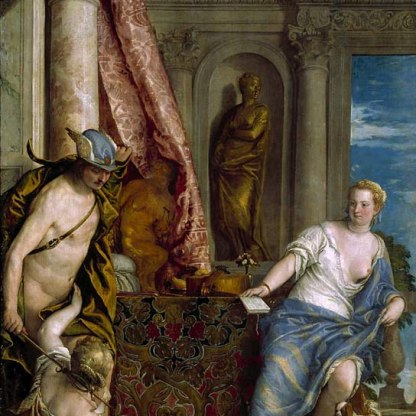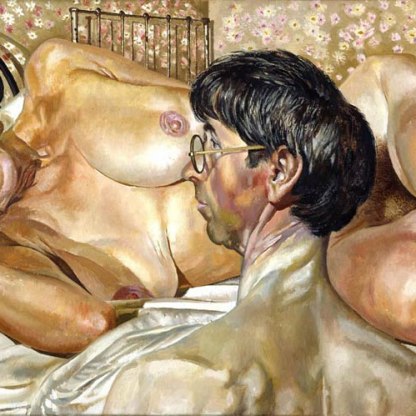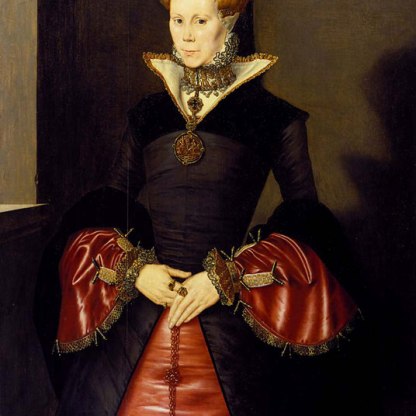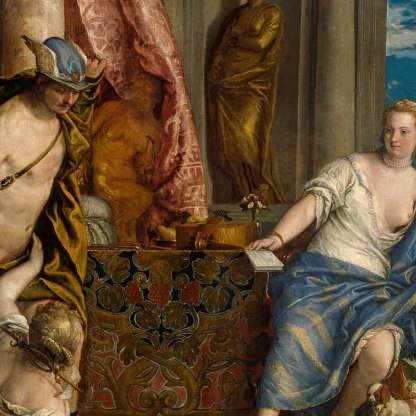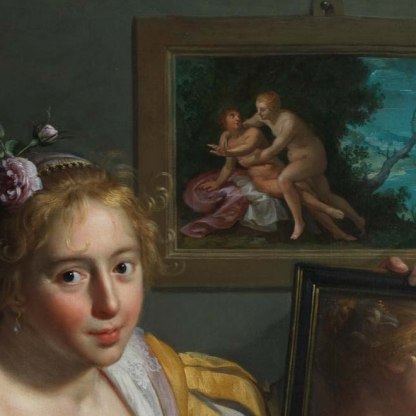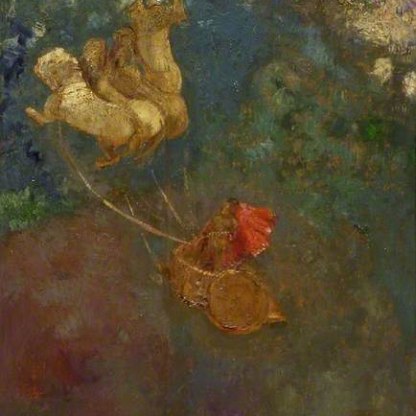Hermes, Herse and Aglauros
The story of Hermes, Herse and Aglauros is told by Ovid, in Metamorphoses, 2, ll. 711–832.
It happened that Athens' chaste maidens were following their custom and bringing pure offerings to Minerva's citadel on her festival, in garlanded baskets carried on their heads. Hermes spotted them as he flew home, and altered his course to take a closer look. Just like the kite, so swift on its wings when it sees animal entrails, hovers in a circle and is afraid to approach while the priests stand crowded round the sacrifices ... so did the agile Cyllenian Hermes, diverted, circle around in the same part of the sky.
And just as Lucifer the morning star shines more brightly than the other stars, and golden Phoebe shines more brightly than Lucifer, so did Herse stand out among all these maidens. She was the jewel of all her companions in the procession.
Jove's son was stunned by her beauty, and he burned as he hung there in the air, like lead thrown by a Balearic sling, which glows white as it flies, and under the clouds finds a fire that it did not have before.
Hermes, leaving the sky behind, made for the earth. He did not even disguise himself, so confident was he in his beauty. All the same, he took care to smooth down his hair and arrange his cloak so that it would hang just right, so the hem and all the gold would be showing. And he made sure that the wand in his right hand – the wand which brings on and wards off sleep – was polished, and that his sandals gleamed on his scrubbed feet.
In a woodcut from an illustrated 1505 edition of The Metamorphoses in the Fitzwilliam, left, we see the god hovering above Athens as he spies upon the maidens. Ovid goes on to describe his arrival at Herse's house.
Aglauros ventured to ask the stranger his name, and why he had come. He replied: 'I am the grandson of Atlas and Pleione, and carry through the air my father's words as he commands. My father is Jupiter himself. I shall not disguise my motives – only may you prove willing to be loyal to your sister and to be called the aunt of my children. Herse is the reason for my journey. I pray that you may show favour to one who is in love.'
Aglauros looked at him with those same eyes with which she had recently beheld the hidden secrets of golden Minerva. She demanded a large sum of gold as payment for her duty, and in the meantime she forced him to leave the house.
This moment, when Aglauros challenges Hermes at her sister's threshold, is shown on an Italian maiolica plate in the Fitzwilliam museum shown below [C.79-1961].
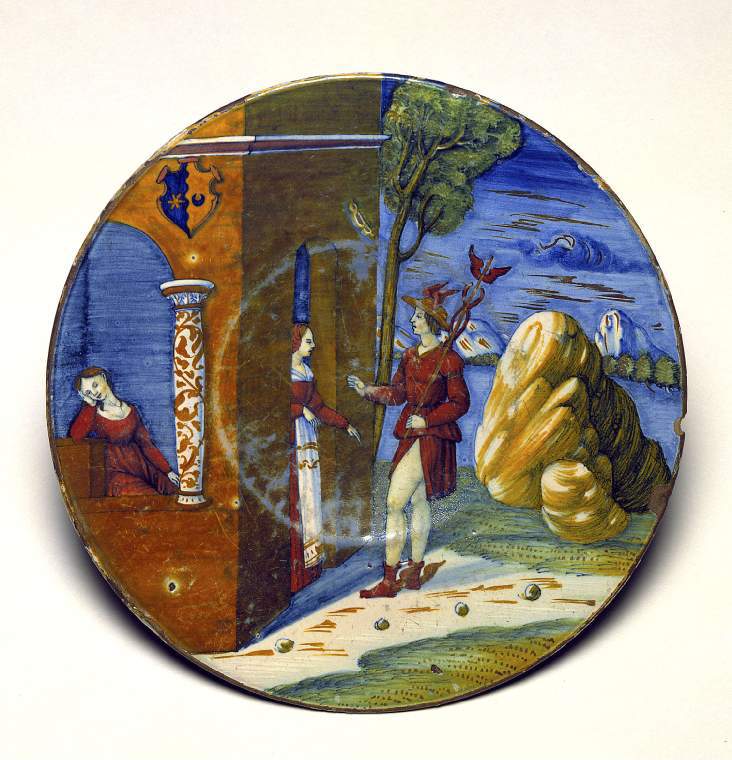
Ovid then describes how the goddess Minerva, whose mysteries Aglauros has violated, decides to poison her mind with jealousy for her sister:
Immediately Minerva made for the slime-covered house of Envy. Her home is hidden deep in a valley, where there is no sunlight and no passage for any wind. It is a tearful place, full of sluggish cold, always devoid of fire, always abundant in darkness.
When the fearsome maid of war arrived there, she stood before the house (for she did not think it right to enter the building), and beat on the doorposts with the very tip of her spear. The doors opened when she struck them, and inside she saw Envy, eating the flesh of vipers – the nourishment for her twistedness. When she saw her, Minerva turned her eyes away, but Envy sluggishly got up off the ground, leaving the bodies of half-devoured snakes, and approached with spiritless steps. When she saw the goddess in the glory of her beauty and arms, she groaned and grimaced, and gave a deep sigh.
Pallor lies on Envy's face, emaciation in her whole body. Her eyes never look straight at you, her teeth are stained with decay, her breast green with bile, and her tongue awash with poison. She knows no laughter except when the sight of miseries prompts it. She enjoys no sleep, kept up by wakeful worries. But she sees the unwelcome success of men and, seeing it, wastes away, at once gnawing and gnawed at. She is a punishment to herself.
Much as she loathed her, Minerva nevertheless addressed her with these words: 'Infect with your decay one of Cecrops' daughters. This is your task. Aglauros is the one.' With that she escaped, leaning on her spear and pushing off from the ground.
Envy turned her eyes sideways to see the goddess retreating, then gave a little moan, grieving that Minerva was bound to enjoy success. She took up her staff, bound in thorny chains, and, pressed in by dark clouds wherever she walked, she trampled the flowering fields and scorched the grasses and tore at the highest treetops, and with her breath polluted peoples and cities and homes.
Finally she saw Minerva's city, blooming with talent, wealth and the peace of festivals, and she could scarcely keep from crying, for she could see nothing there to cry about.
But after she entered the chamber of Cecrops' daughter, she carried out her orders. She touched Aglauros' heart with her rot-covered hand, filled her breast with barbed thorns, breathed noxious breath into her, distributed resinous poison throughout her bones, and spread venom in her lungs. So that the reasons for this evil passion would not be lost, she placed before Aglauros' eyes her sister and her lucky marriage, and the beautiful image of the god. And magnified them all.
Aglauros was provoked by these visions, bitten by a hidden pain. Troubled day and night, she groaned and melted with misery, wasting slowly, like ice attacked by feeble sunlight. She was burned by Herse's happiness like prickly grass when fire is applied to it – it emits no flames but burns up with a slow heat. Often she wished to die. Often she wished to confess all to her strict father, as if she were guilty of a crime. In the end she went and sat on the threshold opposite her sister's chamber, to keep the god out when he came.
And when Hermes poured out his blandishments and prayers and gentle words, she said to him: 'Enough! I will not move from here until you have been driven off.'
'Let us stand by that agreement then,' said swift Cyllenian Hermes, and laid open the door with his heavenly wand.
Aglauros tried to get up, but her legs, which she had bent while sitting down, were prevented from moving by a sluggish heaviness. She fought to raise herself up and straighten her body, but her knee-joints were rigid. A coldness spread to her very fingertips, and her veins lost their blood and colour. Just as a bitter, incurable cancer will creep and multiply, so did the lethal chill, bit by bit, enter Aglauros' breast, closing the paths of life and breath.
She did not try to speak, nor, if she had tried, would she have had a passage for her voice. Rock was already taking hold of her throat, her mouth was growing hard, and she sat there, a bloodless statue. But the stone was not white, for her mind had infected it.
Other highlight objects you might like
Other pathways and stories you might like
Sign up to our emails
Be the first to hear about our news, exhibitions, events and more…

